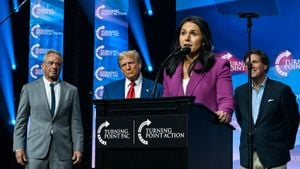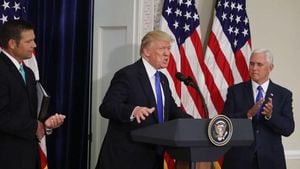With Donald Trump back at the helm after winning the 2024 presidential election, businesses across the globe are bracing themselves for policy changes with far-reaching consequences for trade and the economy.
One major area of focus is international trade, particularly tariffs. Trump has vocally threatened to impose hefty tariffs of up to 60% on imports from China and as much as 100% on specific goods from Mexico, including automobiles. Such changes, if enacted, could have significant ramifications for American consumers and businesses alike, particularly those based in California, which heavily imports from these countries.
Indeed, nearly 40% of California's imports came from Mexico and China last year. Economists warn these tariffs could escalate prices on everyday goods, ranging from electronic devices to groceries, intensifying the state's already challenging cost of living. According to Stephen Levy, director of the Center for Continuing Study of the California Economy, "The port and logistics complex in Southern California is very important to the economy and directly tied to the countries he threatened." This sentiment is shared by numerous business experts who worry about the ripple effects on jobs within the state's agricultural, trade, and manufacturing sectors.
Meanwhile, manufacturers like Steven Madden have expressed urgency to shift their supply chains away from China before such tariffs take effect. The company is targeting to cut its reliance on Chinese manufacturing by 40% within the next year, indicating readiness for substantial shifts within the retail space.
From the other end of the spectrum, Trump’s administration is expected to tighten U.S. immigration policies. Experts anticipate stricter regulations for employment-based visas such as H1B and L1, which may hinder companies' ability to attract and retain skilled international talent. Some businesses are now opting to establish operations across borders, particularly to Canada and Mexico, as contingency plans if their visa applications are denied.
The potential conflict between China and Taiwan is also raising international eyebrows, as any escalation could prove detrimental to global supply chains. This unrest adds another layer of uncertainty for businesses planning their operational strategies.
The U.S. economy, which had been showing signs of recovery, may face turbulent waters with these impending trade policies. A mix of decreased consumer spending power—due to possible price increases from tariffs—and trickier global trade negotiations is creating anxiety among economic analysts. Many economists view these proposed tariffs as not just another policy change but as potentially regressive taxes on lower and middle-income families.
Interestingly, the automotive industry is already on high alert. Automakers with connections to Mexico, such as Nissan, have seen speculation about layoffs paired with the threat of tariffs. Nissan announced plans for job cuts globally; yet, the company asserted this decision was not directly linked to expected tariffs, highlighting the complex interplay of market pressures amid policy uncertainty.
While traditional sectors like oil and gas look poised to benefit under Trump’s deregulated climate doctrine, renewable energy sectors may find themselves at odds with the administration's possible policy shifts, reflecting the delicate balance at play.
Overall, the consensus among economists and industry experts is clear: The expected imposition of tariffs combined with tighter immigration controls could severely affect the volatility of the economic market. Companies are urged to adjust their strategic frameworks to adapt to the unpredictable shifts likely to accompany Trump's second term. Just like the suppliers scrambling to secure alternatives to Chinese manufacturing, businesses should prepare for waves of policy changes—primarily by reassessing their operations globally.
And as these shifts manifest, consumers could be left holding the bag, facing heightened prices across the board. The era of Trump’s presidency remains as captivating and complex as ever for both the trade scene and consumer wallets alike, inviting everyone to stay alert and prepare for the potential repercussions as they develop.



